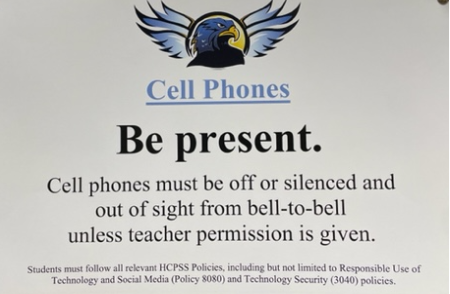By Lauren Shin, Staff Writer
Finally transitioning out of the COVID-19 phase, the 2022-2023 school year is more familiar to what students were used to before the pandemic. What they aren’t accustomed to, however, is the newly implemented phone policies.
Although every teacher has slightly varying levels of regulation, the general idea remains the same: phones are not allowed during class and will be taken away if they are.
The absence of phones not only allows students to focus on what’s being taught during class, but also helps form a stronger relationship with their peers.
With that being said, it is also true that the mere restriction of phones compels students to find other ways to secretly use them. This begs the question; is forcing students to keep their phones away a good strategy for building a stronger community?
Hanna Mulugeta, a freshman, suggests that this may not be the best approach. She states, “A lot of us are on our phones during lunch for most of the time. We have so many classes to spend time together so it’s not like we’re always fixed to our phones. Lunch is the only time we can use them without getting in trouble.”
However, students seem to have a general understanding that phones can be a great source of distraction in class and interfere with their learning. Still, many students found themselves itching to pick up their phones and text their friends, or to check social media for any new notifications.
Sophomore Christopher Jung shares that to a certain extent, he agrees with the cell phone policy: “I guess it’s reasonable, but I would say not endurable. Everybody is kind of always on their phones and it’s hard to resist using it in class. I don’t think it’s necessary to put away our phones in our backpacks like we’re required to in some classes. I mean, leaving them on our desks and using it occasionally for a short period of time should be okay, I think.”
Sarah Chin, a junior, believes that the rules “make sense because we have to focus on learning,”. However, she also feels that the seriousness of teachers may come across as a bit harsh. “Maybe don’t be so mean about it. Some teachers are kind of mean and strict about students having their phones out. I get that they’re trying to show how important the rules are to them, though,” she says.
A trend can be seen that upperclassmen are generally a little more understanding of the phone policy and try to think in the teachers’ perspectives.
Senior Tiffany Liu states, “I feel bad for teachers sometimes. They even have to sit in the hallways because of us.”
When asked how often she picked up her phone in class last year, Tiffany responded by saying, “I actually rarely used my phone in class. Maybe it was because I was trying to focus on what the teacher was saying so I wouldn’t fail the AP test. Most other people didn’t use their phones either so there wasn’t anything to constantly check for.”
Riya Patel, also a senior, empathized with the teachers as well: “People have no self control; they can’t just not use their phones. Like, how bad were students last year that administrators have to be so strict this year?”
Students, whether they agree with the new policies or not, will have to get used to the new classroom norm; one where phones are out of the picture. Hopefully, this will lead to enhanced learning and participation, as well as more focused students.

